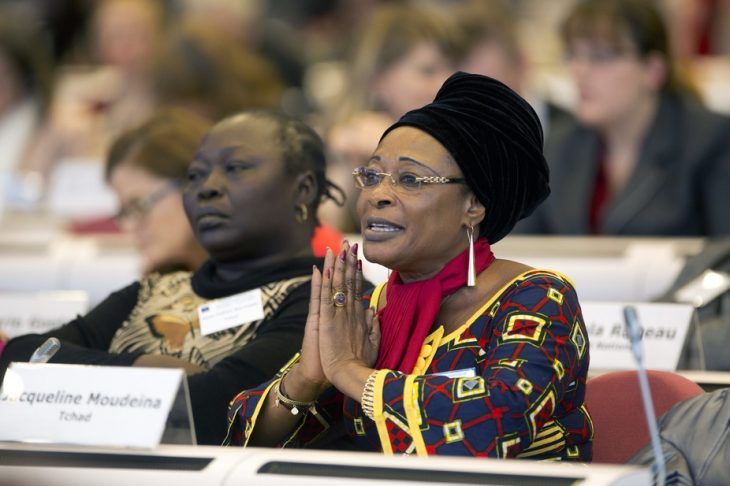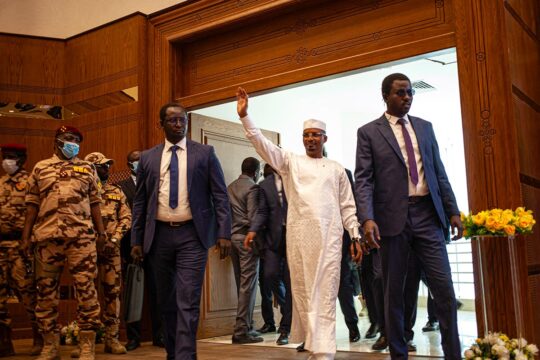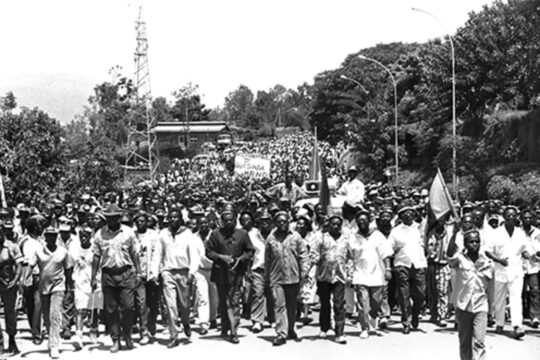On May 30, in an African court, history was made. In an unprecedented move, a former president was convicted of human rights abuses by a foreign court. In another historic ruling, the accused was also sentenced on counts of sexual abuse and the rape of a prisoner.
Chad’s former dictator, Hissène Habré, who ruled from 1982 to 1990, received a life sentence for crimes against humanity. His conviction comes at a crucial time for international justice in Africa, with several governments threatening to withdraw from the International Criminal Court (ICC). Could Habré’s trial create a groundswell within civil society, leading governments to think twice about withdrawing?
‘No one can whistle a symphony’
In the wake of the ruling, Habré’s former prisoners can hardly believe that their 20-year struggle is coming to an end. Disbelieving cries of “We won!” rang out in Dakar, Senegal, after the Extraordinary African Chambers announced the verdict, and again upon the survivors’ return to N’Djamena.
This is a clear victory for Chad’s civil society and a significant step forward in the fight against impunity. It’s the fulfilment of Souleymane Guengueng’s pledge, made “before God” and against all odds, that if he ever got out of the death camps alive, he would to see that Habré went to trial for his crimes.
This victory also marks the culmination of a two-decade-long fight, led by an unshakable coalition headed up by two Chadian lawyers, Jacqueline Moudeina and Delphine Djiraibé, with support from Reed Brody from Human Rights Watch. Together, this group overcame innumerable political and legal hurdles to bring about this seemingly impossible result. Clément Abaifouta, president of one of the major victims’ groups, summed up this successful joint effort with the saying, “No-one can whistle a symphony.”
The trial’s silver lining
The case demonstrates the impact of justice at its best: its capacity to transform people who have been damaged to their very cores, and to liberate them.
Kaltouma Deffalah was made a sex slave and raped repeatedly over the course of a year. From the comfort of her small home in N’Djamena, she explained the inner change the trial has brought for her:
In the court waiting room, I was still afraid and my hate for Habré was still strong. But when I saw him there in the dock, he was no longer the all-powerful god who had terrorised us. I spoke without fear. My fear and anger towards him disappeared. I released the pain lodged in my stomach, and my scars closed over. I am healed, I am free.
Clément Abaifouta also regained his dignity. He believes this victory will have positive repercussions well beyond Chad’s borders:
Habré’s trial sends a strong message to Africa. With his conviction, we have put Chad on the map. But there are too many places on our continent where torture, theft and rape continue. The fight must go on.
Like the 1998 indictment of Augusto Pinochet by the Spanish examining magistrate Baltazar Garzon, the conviction of Habré has been hailed by human rights activists. It represents a step forward: a court created by the African Union has rendered justice to African victims of an African dictator.
Embarrassment for the government of Chad
Despite Clément, Souleymane and so many other survivors’ infectious enthusiasm, the extent of the trial’s impact remains difficult to ascertain. The government of Chad has been silent on the matter. As one of the victims put it colourfully, “The elephant has fallen, but no one is beating the drums in celebration.”
It is easy to understand the government’s embarrassment. Its attitude towards the trial, which was held in the Senegalese capital Dakar, more than 2,800km from N’Djamena and far from its control, was always one of ambivalence. It was impossible to know how far the judges of the Extraordinary African Chambers would go. Chad’s current president, Idriss Déby, was Habré’s military chief of staff before opposing and finally toppling him. Would his name come up at the trial?

No mention was made of Déby, but the question lingered to the very end – hence the government’s ambiguous position as the trial’s main backer, yet refusing to hand over those responsible for repression under Habré to the Extraordinary African Chambers authorities. Did they fear what these people might reveal?
Furthermore, victims have yet to see a dime of the reparations ordered by the courts, which had been set to be paid by March 25 at the latest.
Will the Habré case reignite the momentum of civil society in Africa? We must take into account that it took 17 years and irrefutable material proof, reinforced by the testimony of hundreds of witnesses, to convict a deposed and isolated dictator – that is, to cut down some dead wood. Mentions of his former political and military allies in Washington and Paris were virtually absent from the trial.
‘Africa sought out the ICC’
This long process illustrates the obstacles faced by international justice, and specifically by the ICC. Its work, and very existence, would be impossible without the energetic support of hundreds of African NGOs, which put pressure on their governments to ratify the Rome Statute in 1998, and lobbied them to call on the new institution.
But how does the ICC measure up today? In the short time since its inception, in 2002, to what extent has it been able to respond to the expectations of African civil society? Whether it’s Boko Haram, the jihadi groups operating in the Sahel, or Daech in Libya and the Middle East, terrorist organisations present a new kind of challenge for international justice. While in the past perpetrators tried to hide, or at least deny their crimes, these groups do the opposite. They document beheadings and other violent acts, signalling their total repudiation of the fundamental rules of international justice, and undercutting the ICC’s potentially dissuasive power.

Clearly this is a pivotal time for international justice. Several governments, led by Kenya, have been using the “war on terror” as an excuse to curtail liberties in the name of security. They plan to withdraw from the ICC, claiming that it unfairly targets African countries and is no longer relevant.
ICC Prosecutor Fatou Bensouda rejects such criticism, stating that “Africa sought out the ICC, not the other way around.” Five African countries – Côte d’Ivoire, the Central African Republic, Mali, Uganda and the Democratic Republic of Congo – asked the ICC to intervene in their jurisdiction, and it was the United Nations Security Council that referred the Libyan and Sudanese cases to the ICC prosecutor.
All the way to the top
But the real reason behind the reticence displayed by some African governments is to be found in the ICC’s power to indict sitting heads of state, as in the case of Sudanese President Omar al Bashir and his Kenyan counterpart, Uhuru Kenyatta (against whom charges were later dropped).
In an interview with JusticeInfo.net, Bensouda reaffirmed her commitment to go after those responsible for international crimes at the highest levels, a cause for concern for some governments who see international courts as blithely oblivious to the concept of national sovereignty.
There is deep division among African states on this question. Some loudly decry “neocolonial” justice, a populist discourse designed to resonate with a majority of Africans who still remember colonial crimes. Others understand the potential benefits, including political benefits, to be gained from the ICC’s intervention.
One major question remains: beyond the initial buzz created by the verdict, will the Habré trial generate a new groundswell among civil societies in Africa? Will they be inspired to continue the fight against impunity, even if it means bypassing the ICC? The answer will help us evaluate the impact of this groundbreaking trial.
Translated from the French by Alice Heathwood for Fast for Word.
This article was originally published on The Conversation and on Justiceinfo.net . Read the original article.






